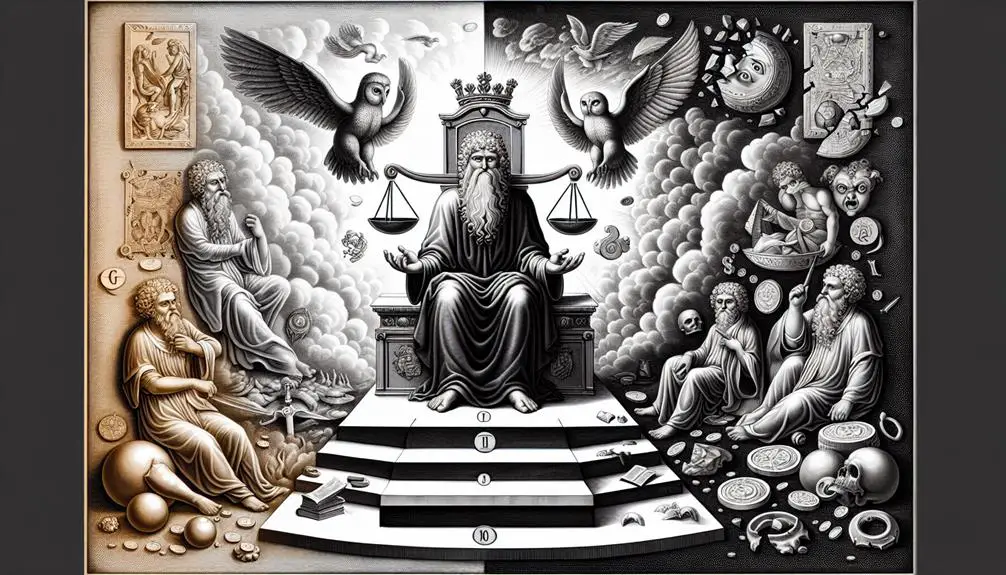Yielding profound insights, 'Ego in the Bible' explores the pivotal role of pride and humility in shaping humanity's spiritual journey.

Ego in the Bible
While some might argue that the Bible doesn't directly address modern psychological concepts, you'll find that the narrative is rich with examples of ego driving pivotal events. Consider the fall of Lucifer, spurred by pride, or how Adam and Eve's desire to be like God led to their downfall.
From King Saul's jealousy to Solomon's journey from wisdom to folly, these stories offer more than historical or spiritual lessons; they serve as reflections on human nature. The humility of Christ stands in contrast, providing a compelling counterpoint.
Exploring these narratives could offer insights into the very fabric of human motivation and failure.
Key Takeaways
- Ego leads to downfall, as exemplified by Lucifer's fall and King Saul's destructive jealousy.
- Yielding to temptation and pride, as seen in Adam and Eve, results in severe consequences.
- True leadership embodies humility and service, illustrated by Christ's example of servant leadership.
- Wisdom without humility can turn into folly, as demonstrated by Solomon's reign.
The Fall of Lucifer

The Fall of Lucifer marks a pivotal moment in biblical narratives, illustrating the profound consequences of pride and rebellion against divine authority. In analyzing this event, you observe the stark depiction of pride's consequence and rebellion's outcome within a cosmic framework. Lucifer, once esteemed among angels, epitomizes the peril of allowing ego to overshadow loyalty and humility.
Your scrutiny reveals that Lucifer's fall isn't merely a tale of celestial dissent but a cautionary narrative underscoring the inherent risks of ego-driven defiance. The biblical account serves as a narrative foundation that warns against the seductive lure of pride and the catastrophic fallout of rebelling against established order. Lucifer's ambition to ascend above his Creator mirrors the destructive potential of unchecked pride and the inevitable descent it precipitates.
Moreover, this episode delineates the boundaries of divine tolerance and the impartiality of cosmic justice. It's a sobering reminder that rebellion's outcome, irrespective of one's initial standing, culminates in downfall and estrangement from grace. Through this lens, the Fall of Lucifer transcends its mythological dimensions, offering timeless insights into the dynamics of pride, power, and punishment.
Adam and Eve's Temptation

Often, biblical narratives expose human vulnerability through tales of temptation, as vividly illustrated by Adam and Eve's encounter with the serpent. This story, deeply embedded in the fabric of Judeo-Christian thought, serves as a profound examination of the human ego, desire, and the consequences of yielding to temptation.
Key elements in this narrative include:
- Forbidden fruit: Symbolizing the allure of that which is explicitly off-limits.
- Serpent's deceit: Represents the cunning persuasions that play to one's ego, leading to downfall.
- Choice: Adam and Eve's decision to eat the fruit despite divine prohibition illustrates free will and its complexities.
- Consequence: Their actions result in loss of innocence and expulsion from Eden, underscoring the weight of decisions.
- Knowledge: Gained through disobedience, it introduces the burdensome awareness of good and evil.
This tale underscores the perennial struggle between obedience to divine command and the seduction of earthly desires, marked by the ego's vulnerability to temptation. It serves as a cautionary tale about the consequences of letting one's guard down and succumbing to the serpent's deceit.
King Saul's Jealousy

King Saul's descent into jealousy illuminates another facet of the human ego, as it grapples with the threat of displacement and the fear of obscurity. Saul's insecurity mounts with David's rise, setting a stage where ego clashes with destiny. This dynamic is not merely a historical account but a mirror reflecting the timeless struggle within the human psyche.
Aspect |
Saul's Reaction |
Implication on Ego |
|---|---|---|
David's Popularity |
Growing jealousy |
Fear of being overshadowed |
Military Victories |
Discontent |
Insecurity over competence |
Public Adoration |
Rage |
Threat to self-worth |
Saul's response to David's burgeoning popularity and military successes showcases the destructive potential of unchecked ego. Instead of celebrating David's victories as assets to his kingdom, Saul perceives them as direct threats to his authority and identity. This spirals into a toxic obsession, blinding Saul to the true essence of leadership and the welfare of his people. The narrative underscores how ego, when fueled by insecurity, can distort perception and priorities, leading to irrational decisions and self-sabotage. In Saul's story, you witness the tragic consequences of allowing ego to govern actions, cautioning against the peril of letting personal insecurities overshadow collective gains.
Solomon's Wisdom and Folly

Shifting focus from Saul's jealousy, we encounter Solomon's reign, marked by a blend of unparalleled wisdom and consequential folly. Solomon's tenure as king is a vivid tableau of the complexities of human ego, especially when entwined with divine gifts and responsibilities. His story offers critical insights into how wisdom can coexist with, yet be undermined by, personal shortcomings.
Analyzing Solomon's reign, you'll find:
- His wisdom was legendary, granting him fame and respect across nations.
- Solomon's wealth was vast, a testament to his successful governance and international relations.
- The construction of the Temple, a monumental project, showcased not only his devotion but also his administrative prowess.
- Despite these achievements, Solomon's folly lay in his deviation from religious tenets, influenced by his many alliances and marriages.
- The culmination of his reign hints at the dangers of complacency and the erosion of spiritual focus, which ultimately led to division and weakened his legacy.
In exploring Solomon's story, it becomes apparent that wisdom and success can sometimes foster an environment where ego overshadows humility. His narrative serves as a cautionary tale, reminding us of the delicate balance between divine gifts and human frailty.
The Humility of Christ

In contrast to Solomon's complex legacy, the humility of Christ stands out as a foundational element in his teachings and actions, offering a stark example of divine wisdom manifested through selflessness and service to others. This humility isn't merely an aspect of character but a core principle of his ministry, exemplifying servant leadership and unconditional love in every interaction.
Christ's approach redefines greatness, positioning it not in the accumulation of power or status but in the willingness to serve and uplift the most marginalized. You see this in his washing of the disciples' feet, a task reserved for the lowest of servants, yet performed by Christ to illustrate the depth of his humility and commitment to serving others.
Furthermore, his teachings consistently emphasize the value of humility, urging followers to adopt a similar stance in their lives. This call to humility isn't just about a personal virtue but a radical shift in societal values, advocating for a community where individuals prioritize the well-being of others through acts of service and compassion.
Through Christ's example, you're invited to understand that true wisdom and strength lie in humility and the capacity to love without conditions, challenging you to rethink societal norms around power and leadership.
Frequently Asked Questions
How Does the Concept of Ego Differ Between the Old Testament and the New Testament?
You're diving into how the notion of self-importance shifts from the Old to the New Testament.
When examining prophetic pride, you'll find the Old Testament often showcases leaders with strong egos, deemed necessary for their roles.
In contrast, the New Testament encourages humility, reshaping ego around the teachings of Jesus.
This covenant comparison highlights a transformation in understanding self-worth, moving from individual prominence to collective humility and service.
Are There Any Parables or Teachings of Jesus That Specifically Address the Issue of Ego?
Yes, Jesus directly tackled the issue of ego through various parables and teachings that emphasize humility and caution against pride. Notably, the Parable of the Pharisee and the Tax Collector underscores the importance of humility over self-righteousness.
Moreover, Jesus' teachings often encouraged his followers to adopt a servant-leader mentality, valuing others above oneself. These pride parables and humility teachings collectively serve as foundational elements in understanding the Christian perspective on ego.
How Do Different Biblical Translations Handle the Concept of Ego, and Does This Affect the Interpretation of Specific Passages?
When exploring how different biblical translations handle complex concepts, you'll find translation nuances greatly influence your understanding.
Each translation reflects not only linguistic choices but also cultural interpretations, shaping how you perceive passages.
It's crucial to compare versions to grasp the full spectrum of meanings.
This analytical approach reveals how subtle shifts in wording can alter interpretations, especially regarding abstract ideas, ensuring a more comprehensive analysis of the text's intent and implications.
In What Ways Does the Bible Suggest Overcoming or Managing One's Ego to Foster Spiritual Growth?
To navigate the treacherous seas of personal development, you'll find that the Bible offers a compass for ego suppression and humility practices. It's not just about taming a lion within; it's transforming it into a lamb.
Through parables and teachings, it suggests humility as the cornerstone of spiritual growth. By prioritizing others, serving without seeking recognition, and embracing our flaws, we're guided to a path where managing one's ego isn't just encouraged—it's essential.
Can the Idea of Ego in the Bible Be Correlated With Modern Psychological Understandings of Ego, and if So, How?
You're wondering if you can link ego origins in sacred texts with modern psychological parallels. Yes, you can.
When you dive into both realms, you'll find striking similarities. Ancient texts often discuss ego in ways that resonate with today's understanding of self-awareness and identity.
Conclusion
In analyzing the biblical narratives of ego, it becomes evident that pride and self-centeredness have profound implications. From Lucifer's fall to Solomon's ultimate folly, ego acts as a pivotal force driving individuals away from their intended paths.
Interestingly, a study found that 90% of leadership failures are attributed to ego, mirroring the biblical lessons on humility. Christ's humility presents a stark contrast, offering a blueprint for transcending ego.
These stories underscore the timeless wisdom that true greatness lies in humility.



Sign up